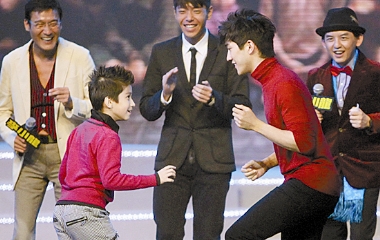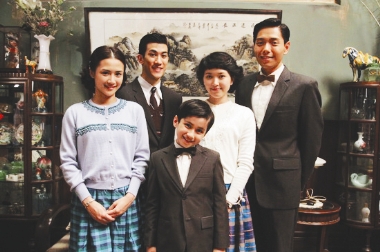
 WHO wouldn’t want to see a biopic about the early life of Bruce Lee? Nearly 40 years after his death, Lee remains not only the most influential screen martial artist of all time, but the world’s most famous Asian actor. Lee’s trademark shriek, yellow jumpsuit, and scratched face and torso made him a cultural icon of the 20th Century. His untimely death in 1973 at the age of just 32 only served to add to his mystique. However, while millions of fans have watched and re-watched his five kung-fu movies, quoted them ad infinitum and probably attempted to re-enact a sequence or two, Lee’s early life, along with the dozens of films he made as a child and teenager, is considerably less well known. What directors Raymond Yip and Manfred Wong set out to do in their new film, “Bruce Lee, My Brother” is shed some light on who Bruce Lee was before he became a legend. Based on the memoir written by Lee’s younger brother, Robert Lee, the film begins with Bruce’s birth in San Francisco, while his father, Lee Hoi-cheun (played by Tony Leung Ka-fai), was touring the United States with his Cantonese Opera troupe. We see the accidental way in which Lee acquired his English name, and also star in his first movie — “Golden Gate Girl”— while still a newborn. Against the advice of his friends, Lee Hoi-cheun whisks his family back to Hong Kong, only to see the city invaded by the Japanese shortly thereafter. The film chronicles Lee’s life up to the age of 18 and his return to the United States, which in turn paved the way for the greater things yet to come. Lee (played by Aarif Rahman) is depicted as cocky, confident and somewhat mischievous, whose involvement in street fights, petty crime and vandalism regularly incur the wrath of his strict father. Raymond Yip served as co-director of “The Warloads” alongside Peter Chan, and Manfred Wong’s regular collaborations with Andrew Lau have proved them both to be competent and hugely cinematic filmmakers. They bring a rich and vibrant look to the film. “Bruce Lee, My Brother” is never less than gorgeous to look at. The problem lies in the fact that whether depicting the Japanese occupation, the uneasy years afterwards as the British regained control and the city slowly began to recover, or even the day-to-day misadventures of a young teenager who also happened to be a local movie star, the film is stupefyingly boring. We see nothing of Lee coping, or struggling with the success and stardom he acquired at a very young age, his brawling and other misdemeanors have no real consequences, his love life is a perpetual non-starter and his home life is equally uneventful. Because our narrator, Robert Lee, was so young during these years, he was understandably kept mostly in the dark about his father’s opium habit, financial pressures from corrupt officials, or even more infuriatingly — pretty much anything of interest that occurred during Bruce’s adolescence. As a result, the film can do little more than meander from one non-event to the next. That is, until someone behind the scenes’ patience obviously snapped and the final reel inexplicably turns into a Donnie Yen movie. Out of nowhere a brash, loudmouthed English boxer appears on the scene and challenges Lee to a fight. At the same time, Lee’s best friend gets involved in drugs and must be rescued from a foreboding squat house, and where there was nothing remotely interesting happening for an hour and a half, there is suddenly a melee of duels, rematches and rooftop run-ins with drug dealers. But by that stage it is all too little too late. Tony Leung Ka-fai is excellent as Lee Hoi-cheun, making a complex and contradictory character sympathetic and likable when he could have easily depicted him as a drug-addled tyrant. Christy Chung returns to our screens for the first time in six years and is delightfully tender as Bruce’s long-suffering mother. There’s also solid support from Michelle Ye and MC Jin. The real praise, however, goes to relative newcomer Aarif Rahman who does a fantastic job as Bruce Lee. Rahman goes far beyond mere imitation, totally embodying the Little Dragon onscreen and perfectly capturing that balance between cock-sure and charismatic that was so integral to what made Lee such a commanding screen presence. The movie is now being screened in Shenzhen. (SD-Agencies) | 
